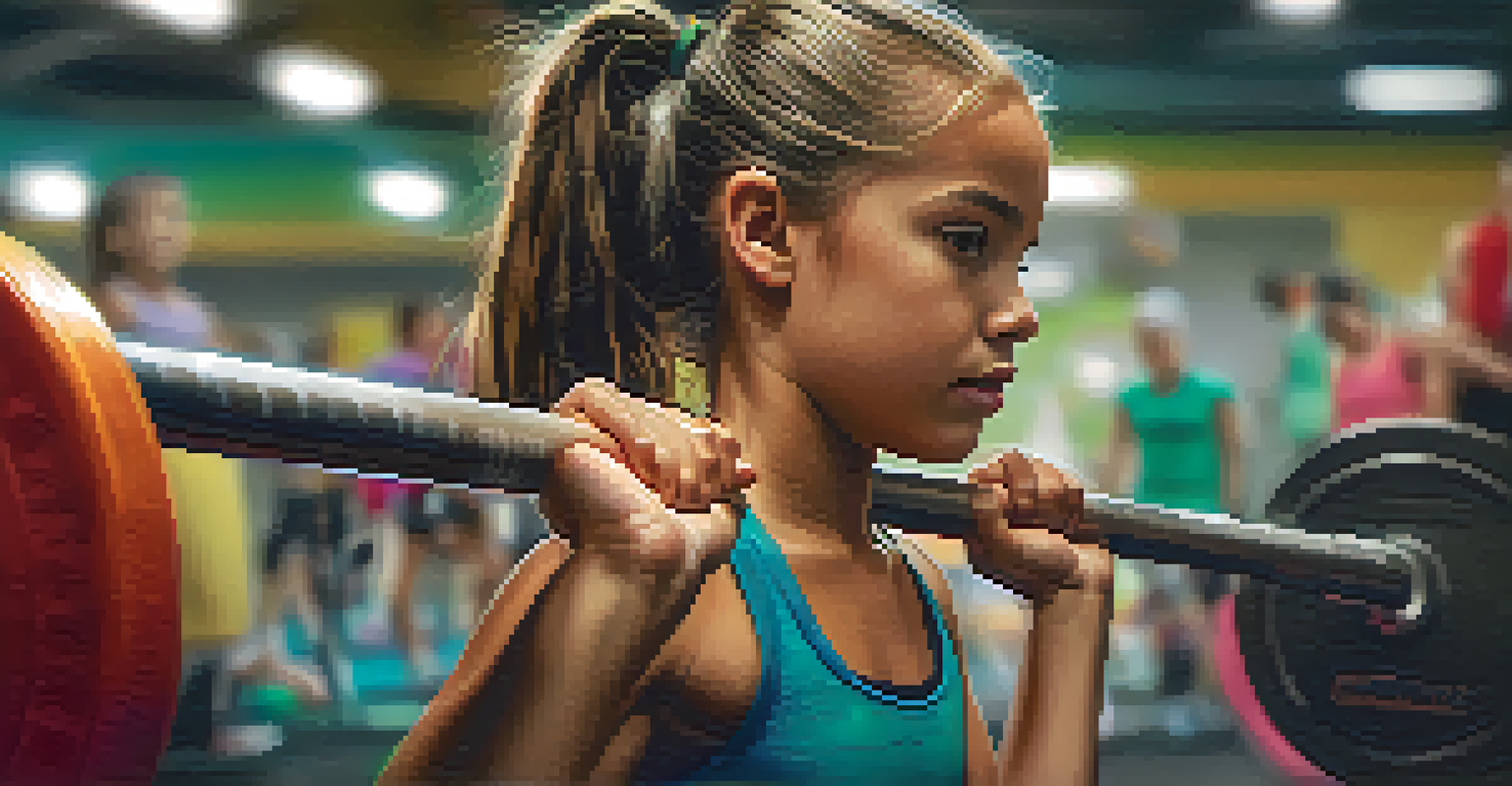Youth Powerlifting Programs: The Future of the Sport

Understanding Youth Powerlifting Programs
Youth powerlifting programs are designed to introduce young athletes to the sport of powerlifting in a safe and supportive environment. These programs typically focus on teaching proper lifting techniques, strength training, and the importance of physical fitness. By engaging youth in powerlifting, we not only foster a love for the sport but also promote lifelong health and wellness habits.
Strength does not come from physical capacity. It comes from an indomitable will.
In these programs, participants usually range from ages 8 to 18, allowing for age-appropriate training that caters to various skill levels. Coaches emphasize the significance of form and safety, which helps prevent injuries while building strength and confidence. The structured nature of these programs provides accountability, encouraging young athletes to set and achieve personal goals.
Moreover, youth powerlifting programs often create a sense of community among participants. By training together, young lifters develop friendships and camaraderie, which can enhance their commitment to the sport. This support system can be crucial in helping them navigate challenges, both on and off the platform.
Benefits of Youth Powerlifting Programs
Participating in youth powerlifting programs offers numerous benefits beyond just physical strength. For starters, powerlifting helps improve overall fitness, coordination, and body awareness, which are essential skills for athletes in any sport. As children learn to lift heavier weights, they build muscle and bone density, setting the foundation for a healthy future.

Furthermore, powerlifting can significantly boost self-esteem and mental resilience. As young athletes achieve their lifting goals, they experience a sense of accomplishment that translates into other areas of their lives. This newfound confidence can help them tackle academic challenges and social situations with greater ease.
Youth Powerlifting Builds Skills
These programs teach proper lifting techniques and promote lifelong habits of health and fitness.
Lastly, youth powerlifting programs teach valuable life skills such as discipline, goal-setting, and teamwork. By committing to a regular training schedule and working towards personal bests, young lifters learn the importance of hard work and perseverance. These lessons are not only applicable to the gym but also serve them well in their future endeavors.
The Role of Coaches in Youth Powerlifting
Coaches play a pivotal role in the success of youth powerlifting programs. They are responsible for teaching proper lifting techniques, ensuring that young athletes understand the fundamentals of the sport. A knowledgeable coach can create a safe environment where children feel comfortable pushing their limits while minimizing the risk of injury.
The strength of the team is each individual member. The strength of each member is the team.
Beyond technical instruction, coaches also serve as mentors, providing emotional support and motivation. They help athletes set realistic goals and celebrate their achievements, fostering a positive atmosphere that encourages growth. This mentorship can be particularly impactful during challenging times, as coaches guide young lifters through setbacks and teach them to stay focused.
Moreover, effective coaches build a sense of community within the program. By fostering relationships among athletes, coaches help create a supportive network that enhances the overall training experience. This camaraderie not only keeps participants engaged but also cultivates a lasting love for powerlifting.
Inclusivity in Youth Powerlifting Programs
Inclusivity is a key focus in youth powerlifting programs, ensuring that all participants, regardless of their background or ability, can enjoy the sport. Many programs actively seek to break down barriers by providing adaptive training options for individuals with disabilities. This commitment to inclusivity not only broadens the reach of powerlifting but also enriches the experience for all involved.
In addition to accommodating diverse physical abilities, youth powerlifting programs often embrace cultural diversity. By welcoming young athletes from various backgrounds, these programs create a rich tapestry of experiences and perspectives. This environment encourages mutual respect and understanding, fostering friendships that transcend differences.
Coaches Foster Growth and Community
Qualified coaches provide technical instruction, emotional support, and help create a strong sense of community among young lifters.
Moreover, inclusivity in youth powerlifting helps challenge stereotypes about strength sports. By showcasing the talent and dedication of all participants, these programs contribute to a broader acceptance of powerlifting as a sport for everyone. This shift can inspire future generations to pursue their passions without fear of judgment.
Challenges Facing Youth Powerlifting Programs
While youth powerlifting programs are gaining traction, they do face certain challenges. One significant hurdle is the perception of powerlifting as a potentially dangerous sport, which can deter parents from enrolling their children. It’s crucial for programs to educate families about safety measures and the structured nature of training to alleviate these concerns.
Another challenge is the need for qualified coaches who understand the unique needs of young athletes. Not all strength coaches have experience working with children, so programs must prioritize hiring or training coaches who are well-versed in youth development. This ensures that participants receive the best possible guidance and support.
Lastly, securing adequate funding and resources can be a struggle for many youth powerlifting programs. Equipment, facility access, and coaching expertise all come at a cost, and programs must find creative solutions to sustain their operations. Community partnerships and fundraising initiatives can play a vital role in overcoming these financial challenges.
The Future of Youth Powerlifting Programs
As interest in powerlifting continues to grow, the future of youth powerlifting programs looks promising. With more schools and community centers recognizing the benefits of strength training, we can expect to see an increase in program offerings. This expansion will provide more opportunities for young athletes to engage with the sport and discover their potential.
Additionally, advancements in technology and training methodologies are likely to enhance youth powerlifting programs. Coaches can now utilize video analysis and performance tracking tools to provide personalized feedback, helping athletes refine their techniques and achieve better results. This data-driven approach can lead to more effective training experiences for young lifters.
Inclusivity Enhances Participation
Youth powerlifting programs prioritize inclusivity, welcoming participants of all abilities and backgrounds to enrich the sport.
Finally, the continued emphasis on inclusivity and diversity will shape the future landscape of youth powerlifting. As programs strive to create welcoming environments for all, we can anticipate a richer and more vibrant community of young lifters. This evolution not only strengthens the sport but also prepares the next generation of athletes to carry the powerlifting torch forward.
Getting Involved: How to Start a Youth Powerlifting Program
Starting a youth powerlifting program may seem daunting, but it can be a rewarding endeavor for communities passionate about strength training. The first step is to assess the interest level among local youth, which can be done through surveys or community events. Establishing a strong foundation of interest will be crucial for the program's success.
Once interest is gauged, finding knowledgeable coaches who can lead the program is essential. It's important to prioritize hiring individuals who have experience working with youth and a solid understanding of powerlifting techniques. Coaches should be enthusiastic about teaching and fostering a positive environment for young athletes.

Finally, securing funding and resources is vital for launching the program. This can involve reaching out to local businesses for sponsorships, applying for grants, or hosting fundraising events. By building a supportive network within the community, you can create a sustainable youth powerlifting program that empowers the next generation of lifters.